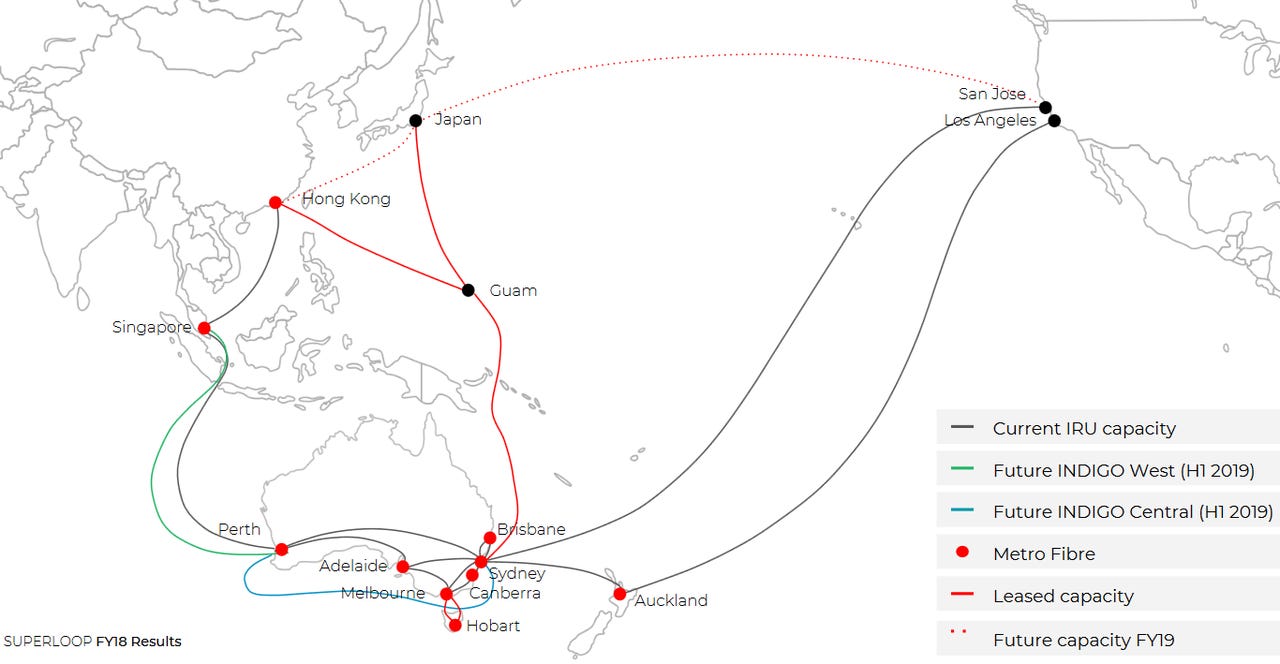Superloop revenue doubles as Indigo subsea cable nears completion


Superloop has announced its revenue more than doubling for FY18, up 109 percent to AU$125.2 million for the year ended June 30, also revealing that its Indigo subsea cable project could be completed by the 2019 financial year.
Net profit for the company was AU$7.1 million, up from last year's net loss of AU$1.2 million, on earnings before interest, tax, depreciation, and amortisation (EBITDA) of AU$29 million, up from AU$4.6 million following its acquisitions of NuSkope, GX2 Technology, BigAir, and SubPartners.
According to Superloop, NuSkope contributed AU$6.7 million in revenue during the year, while GX2 contributed AU$7.1 million, Superloop AU$40.2 million -- including AU$13.8 million from Indigo developments, AU$21.8 million from fixed-wireless services, and AU$25.6 million from fixed-line fibre services -- and BigAir AU$71.2 million. The Superloop+ managed services and cybersecurity business segment contributed revenue of AU$36.6 million.
On the Indigo subsea cable, Superloop said it has already completed the marine survey, cable system manufacturing and factory testing for both Indigo West and Indigo Central, the drilling phase in Sydney for the landing of two subsea cables, installation of the beach manhole in Sydney for Indigo Central, and an agreement to provide its second landing facility to Southern Cross.
Three-quarters of Indigo West and Central total cabling has been loaded onto lay vessels, with lay operations having commenced from Christmas Island towards Perth and then Sydney. The remaining 25 percent of cabling was loaded onto a cable freighter mid-last month, with lay operations to begin mid-September between Singapore and Christmas Island.
The Perth landing is expected to complete in early September, the Sydney landing in mid-October, the Indigo Central final splice in early December, and the Indigo West final splice in late December.
"Construction of one of our biggest infrastructure projects, the Indigo international subsea cable system, is progressing ahead of plan, and subject to weather conditions could be completed ahead of schedule and before the end of this financial year," Superloop CEO Drew Kelton, who commenced the chief executive role at the start of July, said.
"Once complete, Superloop will be able to offer its customers a fully meshed pan-Asian network, and position the company for substantial growth in the years ahead."
Being built alongside Google, Singtel, Telstra, AARNet, Indosat Ooredoo, and Alcatel Submarine Networks, the Indigo cable will span around 9,000km, connecting Sydney, Perth, Singapore, and Jakarta.
Once the Indigo cable system is complete, Superloop said it will have access to 4.5Tbps-capacity fibre, which it will be able to increase over time. It has two fibre pairs and a design capacity of 18Tbps.
During the 2018 financial year, Superloop added 671km of fibre to its terrestrial networks, growing from 217km to 242km in Australia; from 176km to 190km in Singapore; and from 221km to 239km in Hong Kong. It also invested AU$21.8 million in long-term network and capacity agreements -- AU$1.7 million in Singapore, AU$8.6 million in Hong Kong, and AU$11.5 million in international.
The company invested AU$46.6 million in property, plant, and equipment, including AU$18.9 million for Indigo.
With the company referring to the "NBN tsunami", Kelton said Superloop is taking advantage of the National Broadband Network (NBN)-driven churn by working to capture customers.
"This is the biggest disruption to the market since deregulation and we intend to be ready, willing, and able to service them through this transition," Kelton said.
"The rollout of our new Australian national backbone is driving national sales opportunities, including the ability to support our wholesale customers' access to the NBN platform. We will also continue to hyperscale our fixed-wireless network offering in Australia as customers seek increasingly fast and reliable broadband to support their businesses."
During the year to June 30, Superloop established its Superbb retail service provider arm and acquired 10,000 fixed-line customers -- thanks to its AU$1.5 million purchase of SkyMesh's customers in June -- which it said would "kickstart the group's position in the retail NBN marketplace".
Superloop in February reported half-year revenue of AU$56 million, a AU$47 million increase on the same time last year, with underlying EBITDA reported as AU$12.5 million, a jump of AU$14.7 million.
Net profit after tax came in at AU$1.8 million against a AU$2 million loss year-on-year.
Related Coverage
Superloop coughs up AU$1.5m for SkyMesh fixed line NBN customers
Superbb to gain more than 10,000 customers for platform due to go live in October.
Bevan Slattery steps aside as Superloop chief executive
Bevan Slattery will step into an executive director role that has more oversight for 'strategic priorities' for Superloop, the company has announced.
Superloop acquires subsea cable company SubPartners
Superloop has acquired submarine cable construction company SubPartners for approximately $2.5 million following its announcement of the new Indigo subsea cable being built with Google, Telstra, Singtel, and others.
How shark attacks, shipwrecks, and earthquakes threaten global communications (TechRepublic)
Manmade and natural threats have damaged undersea fiber optic cables connecting ASEAN countries as well as Guam, Australia, and the United States, causing issues for some internet users.
Hiring kit: Android developer (Tech Pro Research)
Companies are increasingly dependent on mobile platforms to power their business operations and to enable a productive workforce - and that means hiring topnotch developers to build the apps they need.